I read all these 8 books this year!

And I’ve just lied to you.
- This statement is not precisely true because I read one of the books before 2015. This year I re-read it.
- This statement is not precisely true because I read three of the books twice this year.
- This statement is not precisely true because I don’t feel like I’ve really read the books (and I will be re-reading all eight).
If you’re wondering what the hell is that – it’s one of the perspectives I realized with Gerald Weinberg’s help. Rather, with an aid of Gerald Weinberg’s books. Actually, with an aid of the materials provided in the Gerald Weinberg’s books. And if “aid” is the correct word here.
Come to think about, I may have lied to you in some more ways.
- The exclamation mark may lead you to believe that I’m excited about the fact. But maybe I was surprised or angry about the fact. Maybe I even was disappointed about myself with this fact.
- And which fact? I’ve managed to read all these books? I’ve managed to read 8 books? I’ve managed to read 8 books in a year?
Well, that’s what was discovery of Gerald Weinberg for me:
The sharpness of thinking.
The philosophy and methodology of self-development.
Seeing things from the unthought perspectives. The things look simple only if you don’t really look at them. This complexity will quickly drive you crazy but you can choose to manage it – and Gerald Weinberg is of great help here, too.
Most of the time most of the people don’t mean what they said and don’t say what they mean. I’m no exception. But I can get more congruent myself and learn how to separate signal(s) from noise(s) when dealing with other people.
Another important aspect for me, as an evolving INTJ, was learning about the mechanics of emotions. Preferences are emotions, huh?!
More huh?! Much of what we consider natural and genuine – thoughts, habits, perceptions – are actually the result of development based on random factors that affected our life, especially childhood.
Sometimes they play out as strengths but quite often – as weakness. Becoming aware of one’s own nature, and transforming unconditional principles into heuristics is a path towards being more free and more accountable person.
I’m yet to write dedicated reviews for each book in this golden collection. I’d love to do this with stories. In the meantime, I’m putting main takeaways just off the top of my head.
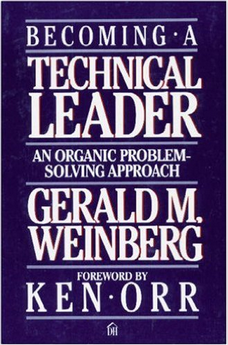
|
- This book inspired me to bring up my testing notebook to a whole new level – it’s my professional journal now.
- This is where I first learned of the concept of “survival rules”. Started working on transformation of my own.
- Gained new perspectives on management with “MOI” model – Motivation-Organization-Innovation. Identified my own strengths and weakness – and set the self-development targets.
|
- This awesome book is not quite about testing techniques and methodologies. And yet, if I had to recommend only one book for reading on software testing, I’d suggest this one: because it makes you understand the purposes, the roles, and the context.
- It also has great little stories that illustrate and help to understand. “Rose, The Test Manager” is an awesome role model.
- In my life, having built an IT career once, then immigrating and building it again from ground zero, I’ve got experiences being a manager both from technical and business sides. I can view Testing as a world – and as a small sand box within Development sand box within Company sand box, and so on. The book grants a critical luxury of getting such perspectives without enduring through all the experiences.
|
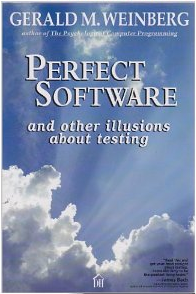 |
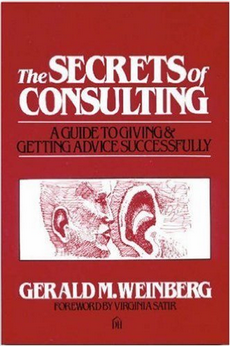
|
- This book is a precious collection of heuristics, experiences to learn and borrow from; applicable well beyond the common view of consulting.
- As it’s always with the heuristics, becoming aware is just a first tiny step towards mastering them. I’ve taken advantage from some of them, like Rutabaga Rule, or Principle of Least Regret, or Orange Juice Test, or the Law of Raspberry Jam. I’m yet to try and practice the rest.
|
- This was both a simple and a hard book for me. Simple, because I’m getting the concept with my mind. Hard, because to feel and act in a new is.. well, hard. Even if you know that it’s the better way.
- The book gives an eye opening perspective on how people give and receive feedback. Most advise in “if I were you..” way missing the person’s perspective and the context. The message then is being received from the person’s perspective and the context – and often comes around in a totally different way than intended by the sender.
- In the world of software development, with conflicting and frequently changing priorities, orthogonal interests of different stakeholders, testers must be very skilled in giving and gathering 0f the feedback – and this is a perfect handbook for learning and practice.
|
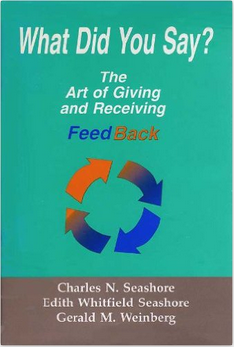
|

|
- If “Secrets of Consulting” were a collection of heuristic techniques for me, “More Secrets..” is a framework intended to organize them into context-driven toolkit.
|
- One of my first epiphanies thanks to this book was the “permission” to choose what to write about and when. As long as it appeals to me I can pick up any idea and write down my thoughts – because I’ve got the energy.
- The book has taught me how to value my inspiration to write, and how to make it productive.
- Strangely, (or maybe not?) I’ve also got a few brand new ideas as a tester, both in test design and reporting.
|
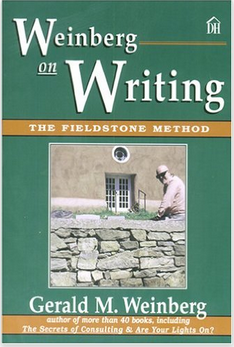
|
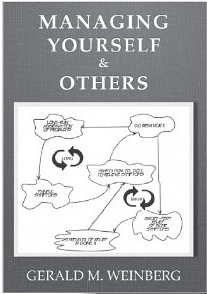 |
- I’ve finished reading this book with a great feeling of disappointment. What?? It’s been around for SO LONG and we have SO LITTLE improvement in the management of software development?! I don’t know. This book MUST BE taught in the universities. Promotion to management must be made impossible for those who hasn’t seriously practiced this book.
- In fact, even for those not aiming to manage other people, this book would be a valuable source for better understanding of themselves (and other people), and self-development, professionally and as a person.
|
- This book takes further. I’d say, reading Weinberg’s books on Technical Leadership, Self-Management, and Consulting would be a useful pre-requisite.
- Need a perfect description of manager’s responsibilities? The book has got them.
- The greatest value of the book is the opportunity to learn from all the experiences and models described there without spending decades of your own career time experimenting. One has a chance to recognize faulty models and build a correction course armed with this book.
|
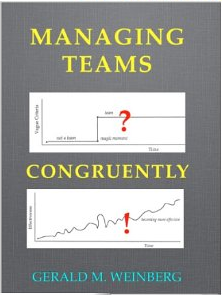 |
Gerald Weinberg, dear sir, – thank you for a wonderful year of learning – and for the years ahead!












One response to "The Year Of Gerald Weinberg"
Thank you, Albert. I feel understood and appreciated, two wonderful rewards for an author.
Keep up your good work, and writing about it.
– Jerry